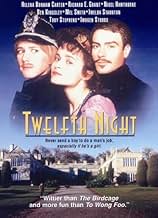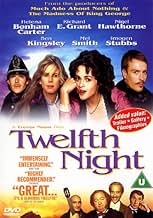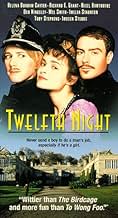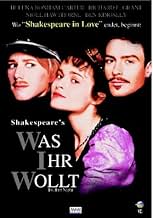NOTE IMDb
7,1/10
6,7 k
MA NOTE
La comédie de Shakespeare sur la confusion des genres, dans laquelle une fille se déguise en homme pour être près du comte qu'elle adore, pour être ensuite poursuivie par la femme qu'il aime... Tout lireLa comédie de Shakespeare sur la confusion des genres, dans laquelle une fille se déguise en homme pour être près du comte qu'elle adore, pour être ensuite poursuivie par la femme qu'il aime.La comédie de Shakespeare sur la confusion des genres, dans laquelle une fille se déguise en homme pour être près du comte qu'elle adore, pour être ensuite poursuivie par la femme qu'il aime.
- Réalisation
- Scénario
- Casting principal
- Récompenses
- 1 victoire et 2 nominations au total
Sidney Livingstone
- Captain
- (as Sid Livingstone)
David Burke
- Party Guest
- (non crédité)
- …
Avis à la une
This is, quite simply, the best production of a Shakespeare comedy ever filmed. The plot is delightfully absurd, the acting brilliant, the direction superb. It is the sort of comedy you can watch over and over again.
As with most Shakespearian comedies, the plot is deeply implausible. However, the excellent Cornish locations at St Michael's Mount & Lanhyrock give a good sense of place and the winter setting (apart from the scene of apple picking!) comes across well - it really does look like an English winter, rather than a picture postcard snow-scene.
The play is cut down to a manageable length without losing the sense of it, The broad comedy aspects (Toby Belch et al) are thankfully limited.
The acting is well done by a cast of British stalwarts. Amazingly, Viola and Sebastian actually do look broadly alike.
This film is best viewed as an amusing light romantic comedy rather than a side-splitter.
The play is cut down to a manageable length without losing the sense of it, The broad comedy aspects (Toby Belch et al) are thankfully limited.
The acting is well done by a cast of British stalwarts. Amazingly, Viola and Sebastian actually do look broadly alike.
This film is best viewed as an amusing light romantic comedy rather than a side-splitter.
Reading other reviews of 'Twelfth Night' it is interesting to see that some people think it is a slow film and others quite fast. It gripped me from the opening gust of rain on a dark night to Feste dancing off into the sunset. Grappling with Shakespeare is a perilous activity but I thought Trevor Nunn brought out the comedy and the emotions of the story well. It is a film to make you smile at the follies of mankind but also their charm.
Ben Kingsley is amazing. I've never seen Feste played that way but it seemed perfect. Imogen Stubbs does the comedy and the drama equally well. The scene with Orsino in the bathtub is a stock one but she does it beautifully, balancing the humour of the situation with the tenderness and the longing. Imelda Staunton brings unusual depth to the character of Maria. The rest of the cast are great too.
The text of the play is changed around but not unnaturally so. The scene that cuts between Feste's song and Viola/Cesario and Orsino playing cards is wonderful, taking in eight of the characters and telling you more about them. The last act of the play is difficult to stage well but Nunn gives it a good shot.
The Cornwall setting is lovely, the radiant sunshine, the green leaves and fine buildings are captured gorgeously by the cameras. I also liked the music very much and find some of the tunes quite hummable.
Very enjoyable and worth seeing again and again.
Ben Kingsley is amazing. I've never seen Feste played that way but it seemed perfect. Imogen Stubbs does the comedy and the drama equally well. The scene with Orsino in the bathtub is a stock one but she does it beautifully, balancing the humour of the situation with the tenderness and the longing. Imelda Staunton brings unusual depth to the character of Maria. The rest of the cast are great too.
The text of the play is changed around but not unnaturally so. The scene that cuts between Feste's song and Viola/Cesario and Orsino playing cards is wonderful, taking in eight of the characters and telling you more about them. The last act of the play is difficult to stage well but Nunn gives it a good shot.
The Cornwall setting is lovely, the radiant sunshine, the green leaves and fine buildings are captured gorgeously by the cameras. I also liked the music very much and find some of the tunes quite hummable.
Very enjoyable and worth seeing again and again.
Trevor Nunn's beautifully photographed and acted, deftly written film is one of the most enjoyable adaptations of a Shakespeare play ever made. Helena Bonham Carter is pitch perfect as the beautiful Olivia, who in "deep mourning" for her dead brother, falls in love with Cesario (who happens to be a woman named Viola dressed up as a man, wonderfully played by Imogen Stubbs, the only actress I've ever seen able to create both a charming Viola and a totally believable Cesario), meanwhile Viola falls for the Duke of fictional Illyria (the exquisite Toby Stephens) who is desperately in love with the Lady Olivia. Meanwhile, Viola's lost twin brother (Steven Mackintosh of "Gentlemen Don't Eat Poets", excellent again here) winds up in Illyria and adds to the confusion. Wonderful, layered support comes from Ben Kingsley playing Feste, Olivia's fool. The only flaw, perhaps, is the few minutes before the conclusion when everything seems to be coated with a thick gloss of sugar; the film comes through this unscathed. Trevor Nunn comes through with an exquisite Shakespeare film adaptation (which is a do or die task). A great showcase for the heavenly cast featuring some of the best performances ever by Bonham Carter (save "Wings of the Dove"), Kingsley (in his best supporting turn ever), novice Stubbs, and Stephens. A very worthwhile effort. Rent it, you won't be let down.
Reading Trevor Nunn's thoughts on his film, it is easy to conclude that they were lucky to obtain such sublime weather for the large duration of the filming, in November. The Cornwall locations are absolutely enchanting; showing an England so far from the urban norm these days. The beautiful natural light, with later dark contrasts, perfectly complements the jovial, winning mood of this Shakespeare comedy brought to screen: and, what is more, this is truly beyond any sense of 'heritage cinema', as Shakespeare's genius is retained.
Yes, it is all a very 'accessible' package, but much is unusual and distinctive to this film adaptation. Ben Kinglsey is perhaps the most glaring instance of a radical re-invisioning; his acting - stripped bare of artifice - is utterly compelling and keeps you watching his every mannerism. This Feste is an eccentric, multi-talented clown and performer, but he also bears words of cutting, melancholy truth. Indeed, both are wonderfully combined with the gorgeously sad scene of Staunton, Grant and Smith listening to his sad song: they listen and the words cut into their veneers. Loneliness is at their very core. What a brilliantly rounded comedy this is; balanced by melancholy - the inch-perfect awry note struck by Hawthorne's Malvolio appearing at the end - and good will - the comradely bonhomie that Grant and Smith are indeed shown to share.
Hawthorne and perhaps more surprisingly Mel Smith and Richard E. Grant really do a fine job and imbuing some real character in their parts; treading a line between broad comedic playing and human sadness. Along with Kingsley's career-best (? not seen too many of his films) performance, they lend this film its heart, and play very well against the wonderful settings. Mackintosh and Stubbs are I guess a little less compelling, but these roles are really difficult to carry off... nothing about them really lingers too long in the memory, like Kingsley's expressions, bizarre little pieces of dance and his pared-down delivery. Helena Bonham Carter is perhaps overly assured as the vain countess dame, Olivia: oh so archly bemused when faced by the cross-gartered, prancing Hawthorne, but generally Ms. Bonham Carter is very much in her usual, predictably petulant, period-costume mode. Which is probably being unfair; she does convince, at the end of the day.
Overall then, a wonderfully colourful delight, bearing the flavour of bright, melancholy late summer-into-autumn. A strange chill is cast by the compelling Kinglsey; a sadness that cannot be dispelled. This film has light amusement in addition to this real edge, and is ultimately a very affecting rendering of a bona fide Shakesperean classic.
Yes, it is all a very 'accessible' package, but much is unusual and distinctive to this film adaptation. Ben Kinglsey is perhaps the most glaring instance of a radical re-invisioning; his acting - stripped bare of artifice - is utterly compelling and keeps you watching his every mannerism. This Feste is an eccentric, multi-talented clown and performer, but he also bears words of cutting, melancholy truth. Indeed, both are wonderfully combined with the gorgeously sad scene of Staunton, Grant and Smith listening to his sad song: they listen and the words cut into their veneers. Loneliness is at their very core. What a brilliantly rounded comedy this is; balanced by melancholy - the inch-perfect awry note struck by Hawthorne's Malvolio appearing at the end - and good will - the comradely bonhomie that Grant and Smith are indeed shown to share.
Hawthorne and perhaps more surprisingly Mel Smith and Richard E. Grant really do a fine job and imbuing some real character in their parts; treading a line between broad comedic playing and human sadness. Along with Kingsley's career-best (? not seen too many of his films) performance, they lend this film its heart, and play very well against the wonderful settings. Mackintosh and Stubbs are I guess a little less compelling, but these roles are really difficult to carry off... nothing about them really lingers too long in the memory, like Kingsley's expressions, bizarre little pieces of dance and his pared-down delivery. Helena Bonham Carter is perhaps overly assured as the vain countess dame, Olivia: oh so archly bemused when faced by the cross-gartered, prancing Hawthorne, but generally Ms. Bonham Carter is very much in her usual, predictably petulant, period-costume mode. Which is probably being unfair; she does convince, at the end of the day.
Overall then, a wonderfully colourful delight, bearing the flavour of bright, melancholy late summer-into-autumn. A strange chill is cast by the compelling Kinglsey; a sadness that cannot be dispelled. This film has light amusement in addition to this real edge, and is ultimately a very affecting rendering of a bona fide Shakesperean classic.
Le saviez-vous
- AnecdotesIn the mid 1950s, director Joseph L. Mankiewicz tried to set up a version with Audrey Hepburn and Danny Kaye, but it failed to materialize.
- GaffesDuring one of the final scenes, when Malvolio reenters, it can be seen that his left shoe is missing. However, as he is walking up the stairs, you can clearly hear both heels clicking on the steps.
Meilleurs choix
Connectez-vous pour évaluer et suivre la liste de favoris afin de recevoir des recommandations personnalisées
- How long is Twelfth Night?Alimenté par Alexa
Détails
- Date de sortie
- Pays d’origine
- Site officiel
- Langue
- Aussi connu sous le nom de
- Twelfth Night
- Lieux de tournage
- Lanhydrock House, Bodmin, Cornwall, Angleterre, Royaume-Uni(Olivia's house and garden)
- Sociétés de production
- Voir plus de crédits d'entreprise sur IMDbPro
Box-office
- Budget
- 5 000 000 $US (estimé)
- Montant brut aux États-Unis et au Canada
- 588 621 $US
- Week-end de sortie aux États-Unis et au Canada
- 33 451 $US
- 27 oct. 1996
- Montant brut mondial
- 588 621 $US
Contribuer à cette page
Suggérer une modification ou ajouter du contenu manquant




































